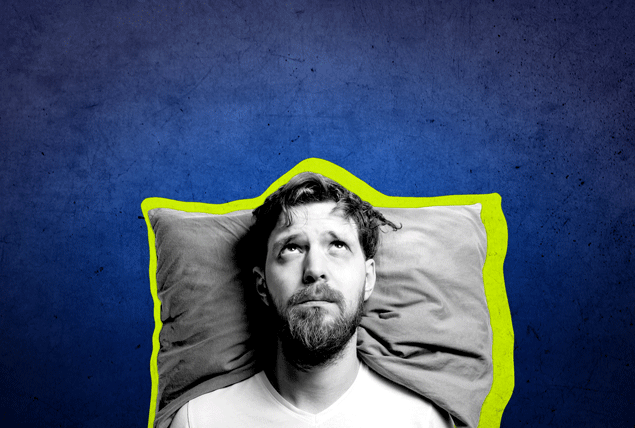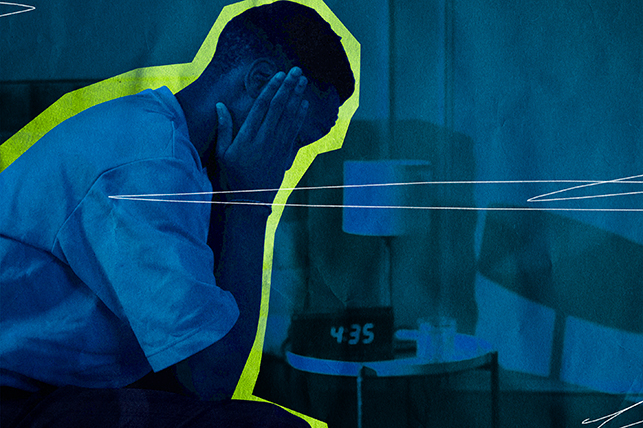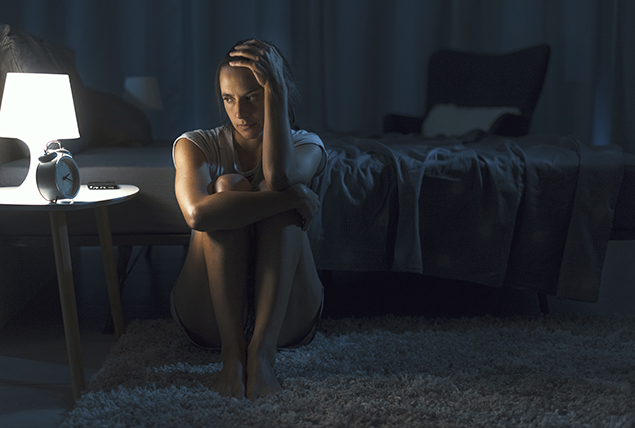Does Insomnia Affect Your Sex Life?

If left untreated, insomnia—an extremely common sleeping disorder—can permeate nearly every facet of your health. And that includes your sex life.
Sleep specialists say there's a direct link between the quality of sleep and the quality of sex. If you feel like both are eluding you, you're not alone.
"The bedroom was designed for two things: sex and sleep. But unfortunately, most Americans aren't getting quite enough of either," said Lauri Leadley, the founder and president of Valley Sleep Center, with outlets around Phoenix. "If we're not sleeping well, we're not living well. We're creating a perpetual cycle of always feeling fatigued, tired and unmotivated for anything other than just trying to get some rest. Dragging all day and having anxiety about getting enough sleep at night doesn't exactly set the mood for romantic foreplay."
Learn more about the connection between sex and sleep, and pick up some tips from sleep specialists on how to approach dating with insomnia.
Insomnia's impact on sexual health
Chronic insomnia disorder is directly linked to sexual dysfunction, said Po-Chang Hsu, M.D., a medical content expert for SleepingOcean, a Toronto-based online resource for information and products that support healthy sleep.
"People with insomnia usually have a tendency to have less sexual interactions with their partners," he said. "This is one of the main health issues that come with insomnia in the long term."
Research suggests a lack of quality sleep can lead to a decreased libido for men and women.
"A 2017 study published in the Archives of Sexual Behavior suggested that people, whether single or married, were having less sex in the early 2010s than they were in the late 1990s—at a rate of nine fewer times per year, with millennials having the least amount of sex of all. Researchers say it isn't due to longer work hours or increased use of pornography," said Michael Pelekanos, M.D., the medical director of the Valley Sleep Center in Chandler, Arizona.
"Instead, studies have shown that the leading cause of the decline in mood, libido and romantic motivation is simply a lack of quality sleep and few people getting the recommended seven to eight hours per night," he added.
Insomnia's impact on reproductive health
Quality sleep is an essential factor in reproductive health for men and women, Hsu explained. It comes down to the importance of your circadian rhythm in hormone production.
"Quality sleep and synced circadian rhythms in both men and women help produce sex hormones necessary for reproduction," he said. "A lack of sleep or insomnia can reduce the chances of fertility in women and increase the chances of erectile dysfunction (ED)in men."
Sex can boost your sleep health
In the relationship between sex and sleep, the inverse is also true. The sex you're having can also affect your sleep.
Pelekanos said having sex can give your sleep health a boost, which in turn further helps your sex life—a true win-win.
"Having sex before sleep benefits you in more ways than one. Stress reduction, increased energy, mood stabilizer, you name it," he continued. "Not only is it clear that sex helps you sleep but getting good sleep helps you have more sex. So essentially, the two areas in which people seem to be lacking the most could both be resolved at once."
The key to sex's sleep health benefits lies in the orgasm, Leadley noted, which sees the release of what she referred to as a "hormone cocktail."
"When you have an orgasm, you release a cocktail of chemicals including oxytocin, norepinephrine, vasopressin, prolactin and serotonin," she said. "All of these things are clinically proven to improve your sleep quality."
Exactly how do the hormones and compounds released during an orgasm support your sleep health?
Oxytocin
"This hormone is most often referred to as the 'love hormone' because it promotes bonding," Pelekanos said. "It's involved in childbirth and breastfeeding, and it's also associated with empathy, trust, sexual activity and relationship-building. It counteracts the impact of cortisol on our bodies, which is the stress hormone."
Elevated nighttime cortisol levels are going to leave you exhausted physiologically, but you may also feel wired and restless.
"Oxytocin is a great buffer, as orgasms lower cortisone levels and essentially relieve stress," he added.
Vasopressin
Vasopressin is another compound released during orgasms that aids in reducing cortisol, according to Pelekanos.
Serotonin
"Commonly known as the 'feel-good hormone,' serotonin is the key chemical that stabilizes our mood, feelings of well-being and overall happiness," Pelekanos said.
It impacts our entire body and enables brain cells and other nervous system cells to communicate with one another, he added. It is serotonin that helps facilitate deep, non-REM sleep. The hormone norepinephrine then kicks in during REM sleep.
Norepinephrine
"Norepinephrine, also known as noradrenaline, is a naturally occurring chemical in the body that acts as both a stress hormone and neurotransmitter," Pelekanos said. "This hormone often helps regulate the body's sleep and wake cycles and facilitates the efficacy of REM sleep.
"The constant ebb and flow of serotonin and norepinephrine play a large part in regulating our overall sleep cycles."
How to date with insomnia
Since sex and sleep are inextricably linked, it may be helpful to communicate with your romantic partner about your sleep health and habits early in your relationship. That's especially true if you're experiencing a sleep disorder such as insomnia. This way, both parties will fully understand each other's sleep patterns, which can lead to more calm and informed decision-making if your shared sleeping experiences go awry.
Hsu suggested establishing a couple of baselines with a new romantic partner.
"First and foremost, there should be a mutual understanding of each other's sleep patterns, and neither of you should try to change the other. Secondly, if one partner has insomnia, it's better to sleep in separate rooms or on separate beds, so the person with insomnia will not affect their partner's sleep schedule," Hsu said. "Furthermore, it's important for the person with insomnia to explain the condition to their partner and educate them on possible symptoms, as it often helps to reassure your partner that treatment is ongoing."
Leadley noted that working with your partner as a team to create a mutually agreed upon sleep routine can even be an intimacy builder.
"Be open and come up with a solution that works for both of you," Leadley said. "Create a sleep routine you can participate in as partners, including powering down electronic devices, preparing a turn-down that includes comfy sheets, pillows and a mattress you both love and, by all means, be intimate. Snuggle, make out, enjoy a meditation app together."
Pelekanos said that when it comes to talking to your partner about sleep, honesty is the best policy, even if that means voicing concerns about either your or their sleep health.
"An open conversation about your concerns about disordered sleep can go easily, as long as it comes from a place of concern and care rather than criticism," he said.


















